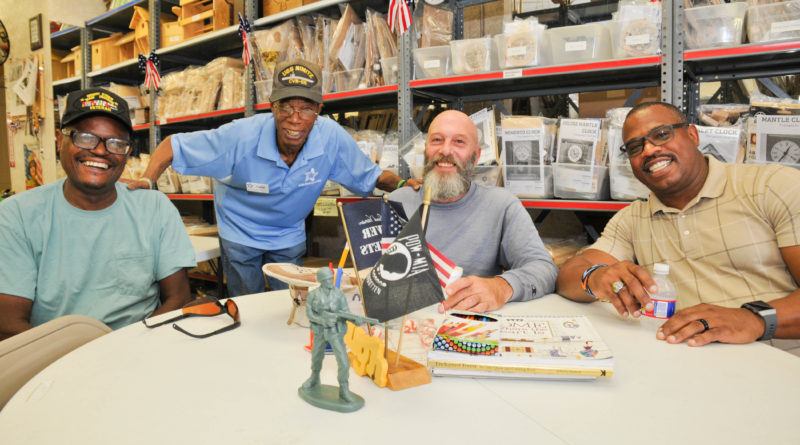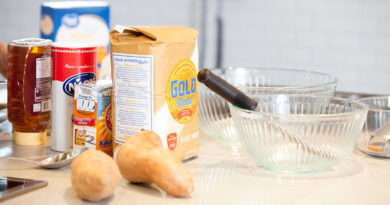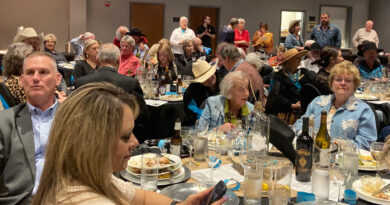Veterans Find Hand-Crafted Healing
By Stacy Moser | Photography by Nan Dickson
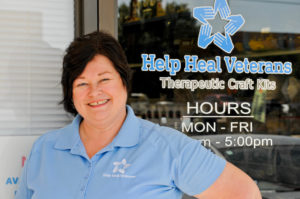 Army veteran J. M. “Sarge” Valderrama rests his elbows on a table to steady his hands as he carefully attaches a wheel onto a miniature airplane. Next to him, Andre Johnson pushes a large needle though a swatch of leather—he’s almost done with the pouch he’s sewing together. Brent Williams, also an Army veteran, leans back from the table and takes a sip of coffee as he watches both of his friends intently, joking that they aren’t going fast enough.
Army veteran J. M. “Sarge” Valderrama rests his elbows on a table to steady his hands as he carefully attaches a wheel onto a miniature airplane. Next to him, Andre Johnson pushes a large needle though a swatch of leather—he’s almost done with the pouch he’s sewing together. Brent Williams, also an Army veteran, leans back from the table and takes a sip of coffee as he watches both of his friends intently, joking that they aren’t going fast enough.
These men are regulars at the Temple chapter of Help Heal Veterans, a small storefront where they can stop in, visit with other vets and choose a free craft kit to keep their hands busy.
“It seems so minor, it’s just a craft kit,” says Trish Alger, craft care specialist at this Help Heal Veterans location. “It’s amazing that something trivial, like making a leather wristband—our easiest craft—takes 10 minutes but can create such a feeling of accomplishment for some people.”
Physicians, therapists and social workers often prescribe arts and crafts as an important part of a patient’s treatment plan. Working on crafts can help alleviate anger issues and the severity of post-traumatic stress disorder (PTSD) and traumatic brain injury symptoms like anxiety, sadness and frustration. The kits help vets overcome physical injuries, too, improving hand-eye coordination and manual dexterity.
Trish’s role here is to function as a Mother Hen for these men and women, many of whom regard her as family.
“Here’s the best part about this job,” she says. “I get paid to talk and listen. You know how many times I’ve gotten in trouble for talking too much on the job in the past?” she laughs. “Let’s say a vet’s had a bad day at their VA appointment, they want to vent about it and they want to get something fun to do. They come here to share with me the things that weigh them down.” She says she hopes they leave a little lighter—with some hope.
“I tell people who are hesitant about trying the crafts, ‘If you can do something that small, you can do something bigger next time,’” Trish explains. “They can go home and deal with their family, bills, medical problems and maybe feel a little less overwhelmed.”
Founded in 1971, Help Heal Veterans has provided free therapeutic craft kits to hospitalized and homebound veterans for generations. To date, over 30 million kits have been distributed nationwide. “The variety of kits is immense,” Trish says. “We have bird houses, bird feeders, wallets, purses. Our corporate donors, like La-Z-Boy and Southwest Airlines, donate pallets of fabric and we make them into messenger bags and moccasins.”
Trish, the volunteers and staff members at Help Heal Veterans deliver kits to many local agencies, hospitals and hospices, like Fort Hood’s Darnall Medical Center, Intrepid Spirit Traumatic Brain Injury Center and Apache Arts & Crafts; Mission Resiliency and Bring Everybody in the Zone (BEITZ) in Killeen—all dedicated to helping veterans and their families deal with the stress of active and post-military life.
“When anyone comes through our door, we ask how their day was. We want the truth, even if it was a horrible day,” Trish says. “One time, a young man walked in and, when we asked how he was, he said he was in agony. ‘I’m in so much pain.’ I looked around at everyone in the room and said, ‘Show of hands guys! How many people are in pain here?’ A lot of hands went up. Then I told the young man, ‘You’re in good company here. If you want to complain, no one’s judging. We’re here to listen to you.’”
 Healing Trips to Vietnam
Healing Trips to Vietnam
Trish Alger recently returned from a trip to Vietnam that she took with her uncle, Pastor Michael Snook, a retired Army veteran who spent two years in Vietnam during the conflict as a radiotelephone operator from 1967 to 1969.
He now works as the director of veterans affairs for the Dave Roever Educational Assistance Programs (REAP) International.
“My uncle takes vets back to Vietnam for healing trips,” Trish explains. “I told him I wished I knew more about his experience over there during the war, and he said, ‘Why don’t you come with me this time?’” Trish, whose hobby is filmmaking, documented the trip, interviewing veterans and filming their interactions with people they encountered.
“It was an incredible intersection for me, between the Vietnam veterans that I serve at work and my uncle’s personal story—and how he helps vets, too. A lot of the vets I meet don’t want to share their story. But sometimes, when we’re alone, they suddenly want to tell me about it. I can say I’ve been to Vietnam, too. I can tell them how the country is now and we can relate so much better to each other.”
Michael has written a book about his experience in Vietnam and the difficulties he faced when he returned, becoming divorced from his wife and suffering from PTSD and alcohol addiction. He recounts his journey back from the dark side in his new book, Vietnam Abyss: A Journal of Unmerited Grace, available on Amazon. Now, he focuses on veteran suicide prevention through his work with REAP.
For more information, go to REAPWorldwide.com/Veterans.
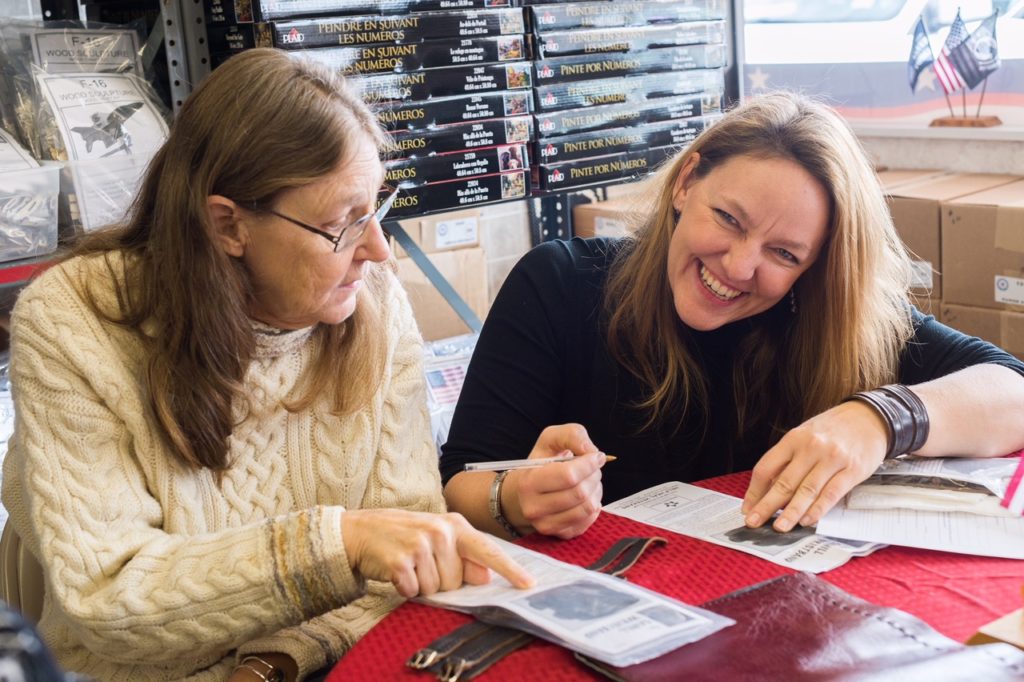
Kerry Cahill Fights Zombies on TV, Fights for Wounded Vets at Home
Kerry Cahill is most widely recognized in her role as Dianne in AMC’s 8th season of the hit TV show “The Walking Dead” and as Rose Tricklebank in Netflix’s Academy Award-nominated film “Mudbound.”
Kerry grew up an “Army brat,” finishing high school in Cameron. She studied drama at Loyola University New Orleans, the British American Drama Academy Oxford and Queen’s University Belfast, later moving to Chicago to study with Second City.
In 2009, when Kerry was 27, her father, retired Army Chief Warrant Officer II Michael Cahill, was killed in the Fort Hood shooting in which 13 people were murdered. He had worked for the VA and volunteered to be at the event where the shooting took place. He was the only civilian killed.
Kerry has subsequently taken up the cause of veterans’ mental health and was the past national spokesperson for AmVets. She and her mother, Joleen, have become very involved with Help Heal Veterans and its cause. Kerry explains that her father wore a leather wristband for most of his life, so Help Heal Veterans created a wristband kit embossed with his signature to honor him. “I’m a megaphone for the cause of suicide prevention and veterans issues,” she says proudly. “I can take that kit and I can promote what Help Heal Veterans does and I can make it louder and get the word out.”

